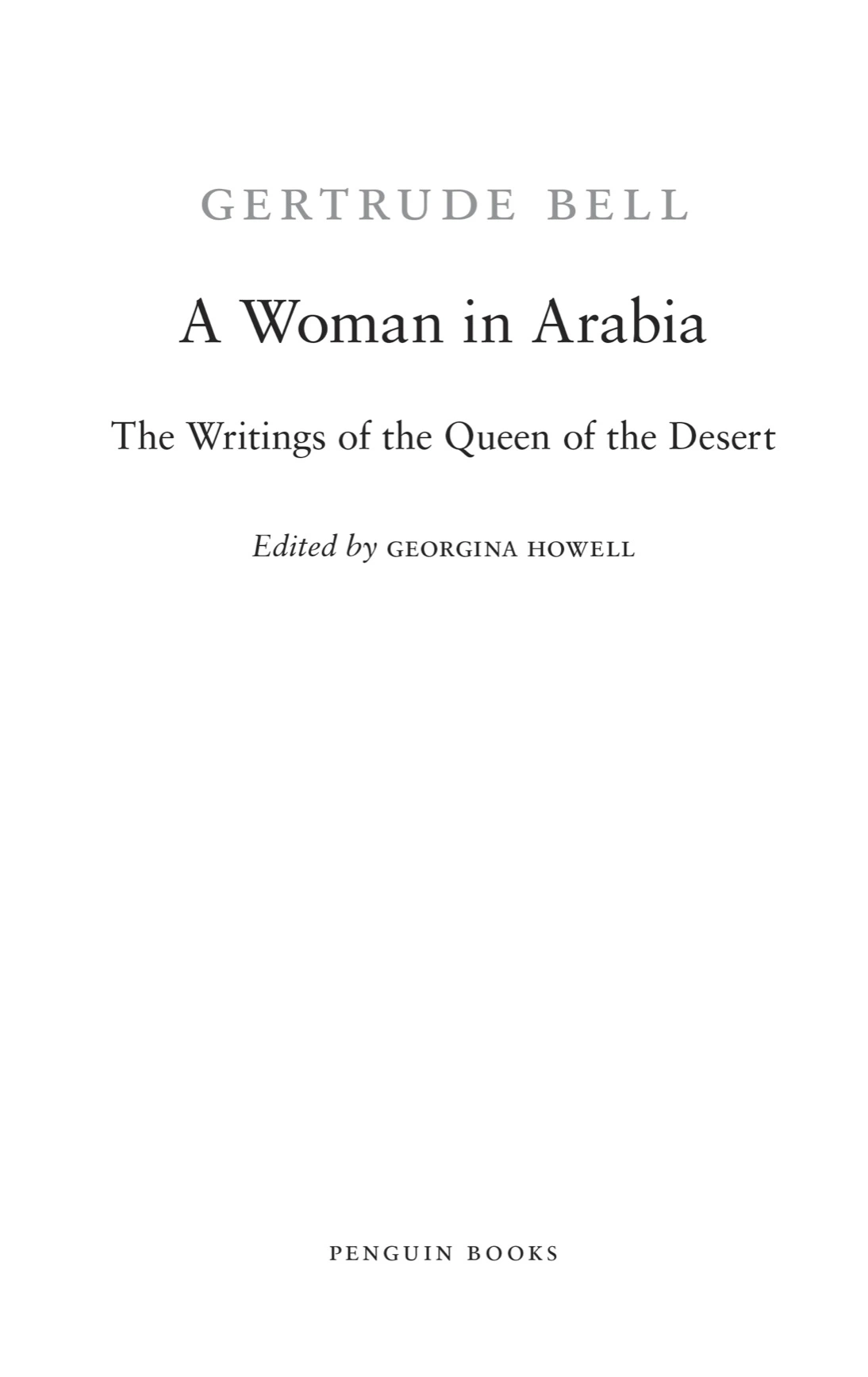A Woman in Arabia
PENGUIN  CLASSICS
CLASSICS
A WOMAN IN ARABIA
GERTRUDE BELL (1868–1926), daughter of pioneers of the Industrial Revolution, turned her back on privilege and society to become a renowned traveler, mountaineer, stateswoman, Arabist, linguist, archaeologist, photographer, and writer. She was born in County Durham, England, and in her youth met such distinguished men of the day as Robert Louis Stevenson, William Morris, Charles Darwin, and Charles Dickens when they visited her grandfather and father in Yorkshire. She began her career at age twenty by becoming the first woman to gain first-class honors in Modern History at Oxford University. She survived seven independent desert expeditions, and during World War I she served as intelligence expert, army major, and adviser for the British armed forces in the Middle East, rising to become the most powerful woman in the British Empire and contributing to the defeat of the Ottoman Empire. On first-name terms with the leaders of the British Empire, she was treated as an equal by the sheikhs and mullahs of Arabia as well. In the administration of Mesopotamia after the war, she achieved her self-imposed mission of delivering self-determination to the Arabs and, along with Winston Churchill and T. E. Lawrence, succeeded in placing King Faisal on the throne of the new Iraq. Her influence spread to Southern Arabia, where her early advice on the threat of Ibn Saud led the British government to modify his territorial ambitions, and to Palestine, where she predicted that the establishment of a Zionist state would cause endless future conflict. In 1917 Bell was named a Commander of the British Empire (CBE) for her service in the war. She died in Baghdad two days before her fifty-eighth birthday.
GEORGINA HOWELL is the author of the acclaimed biography Gertrude Bell: Queen of the Desert, Shaper of Nations. She has written for Vanity Fair, Vogue, The Sunday Times, The Observer, and Tatler. She has one son and lives in London and Brittany with her husband, Christopher Bailey.

BookishMall.com
An imprint of Penguin Random House LLC
375 Hudson Street
New York, New York 10014
penguin.com
Introductions and selection copyright © 2015 by Quilco Limited
Penguin supports copyright. Copyright fuels creativity, encourages diverse voices, promotes free speech, and creates a vibrant culture. Thank you for buying an authorized edition of this book and for complying with copyright laws by not reproducing, scanning, or distributing any part of it in any form without permission. You are supporting writers and allowing Penguin to continue to publish books for every reader.
Chronology and excerpts from Gertrude Bell:
Queen of the Desert, Shaper of Nations by Georgina Bell.
Copyright © 2006 by Manoir La Roche Ltd.
Reprinted by permission of Farrar, Straus and Giroux, LLC.
Letter from T. E. Lawrence to Sir Hugh Bell of November 4, 1927
used by permission of Seven Pillars of Wisdom Trust.
Materials from Robinson Library Special Collections,
Newcastle University, used by permission of the Librarian,
Robinson Library, Newcastle University.
ISBN 978-1-101-63695-4
Cover illustration: Paul X. Johnson
Version_1
Contents
About The Author
Title Page
Copyright
Dedication
Introduction by GEORGINA HOWEL
Note on The Text and Acknowledgments
Chronology
A WOMAN IN ARABIA
The Linguist
The Poet
The “Person”
The Mountaineer
The Archaeologist
The Desert Traveler
The Lover
The Prisoner
The War Worker
The Intrusives
The Nation Builder
The Kingmaker
The Courtier
Epilogue
Index
I dedicate this book to my son, Dr. Thomas Buhler, and to Charlotte Stafford, who have resolved so many of my dilemmas with their knowledge of both literature and publishing
Introduction
The phenomenal Gertrude Lowthian Bell came from a family of wealthy British industrialists in the north of England in the mid-nineteenth century. From sheep farmers and blacksmiths they had become the sixth-richest family in Britain. The Bells at their most powerful employed some forty-five thousand workers at their steel and chemical works and mines. They made the steel components, weighing fifty thousand tons, for the Sydney Harbour Bridge and the track for hundreds of thousands of miles of railways all over the world. They were intellectuals, Liberal voters, and anti-aristocracy, although they had begun to marry into the nobility. In childhood, Gertrude met the scientists, writers, and statesmen of the day as they visited her grandfather and her father in Yorkshire: men such as Charles Dickens, Charles Darwin, Robert Louis Stevenson, and William Morris. Even as a child, Gertrude was intimidated by no one, telling a divinity teacher that she “didn’t believe a word of it.” She began her adult life at twenty, in 1888, by becoming the first woman to gain first-class honors in Modern History at Oxford University. After a life full of adventure and rule-breaking and exploration, she did something of unique importance: she founded a nation, the nation of Iraq.
Her father, Hugh Bell, was married at twenty-three to Mary Shield. A beautiful local girl, she was the daughter of a Newcastle merchant.
1 comment